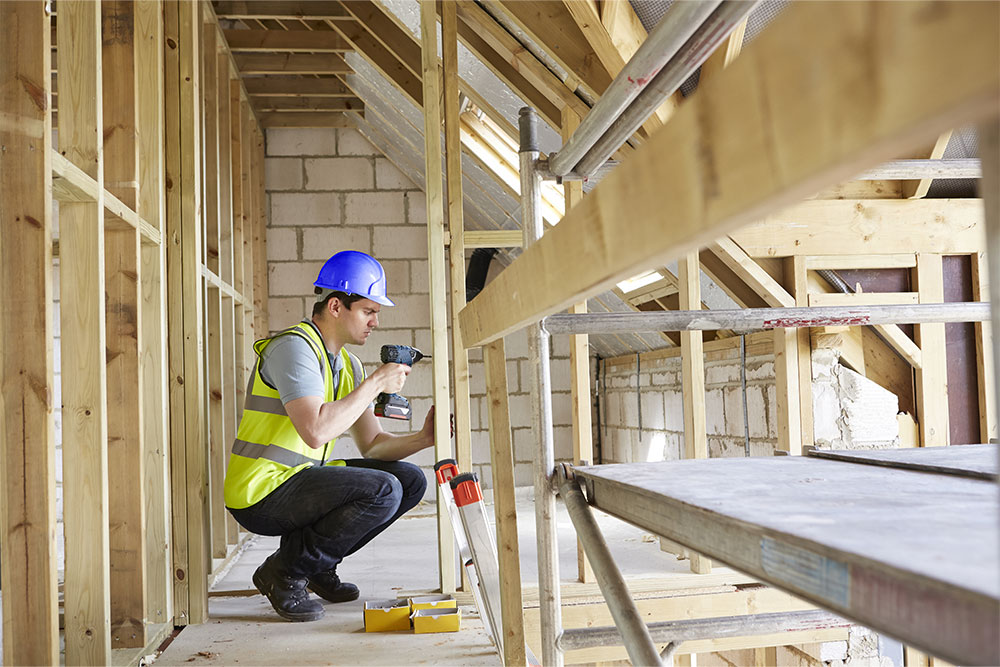
Want to know how to become a construction worker? This guide can help.
Entry-level jobs in construction don’t need qualifications. You can start from scratch and still have the chance to earn well later on. As you gain experience, you could even become self-employed, choosing when and how much you work.
But getting into construction isn’t easy. It’s skilled work. Most jobs need some training or experience first. There are three main ways to get into this industry. We’ve laid them out so you can find the best one for you.
What Does a Construction Worker Do?
This guide looks at how to start as a construction labourer, a standard entry-level job.
Construction labourers help with basic tasks on site, like setting up scaffolding, clearing spaces and supporting more skilled workers.
Common tasks include:
- Marking out and digging trenches for foundations and drains (groundwork)
- Laying concrete for foundations and beams
- Setting up formwork panels for concrete
- Fixing bars to reinforce concrete structures
- Joining steel sheets for excavations
- Resurfacing roads, laying kerbs and paving
- Supplying materials to on-site tradespeople
As you get more experience, you can improve your skills and earn more money. Starting as a labourer can lead to many different construction worker roles. Each offers its own set of tasks and benefits.
You might choose to specialise in specific skills such as bricklaying or move up to supervising others.
Is Construction Worker a Good Job?
Construction work can be a rewarding career path. The salary for construction labourers varies but can increase as you gain more skills and experience. Here are some points to consider:
- Salary Range: Starting wages are competitive and increase with experience.
- Opportunities to Progress: There are many chances to learn new skills and specialise in areas like bricklaying or carpentry.
- Industry Growth: The CITB Construction Industry Outlook reports that an extra 225,000 construction workers will be needed by 2027 across the UK. This expected growth means more job opportunities in every region.
However, be prepared for the demands of the job. Expect long hours and sometimes weekend work, especially when deadlines are tight. Construction labourer roles are also physically demanding and take a decent level of fitness.
What Qualifications Does a Construction Worker Require?
You don’t technically need any qualifications for entry-level construction jobs. But they can help you get a start in the industry.
Two of the most common routes into construction work offer qualifications. These prove a level of knowledge and dedication, which almost all employers want to see.
How to Become a Construction Worker
There are three established ways to start a career in construction:
- College Courses: Some colleges offer construction courses. Often, you need basic qualifications like GCSEs in maths and English to enrol.
- Apprenticeships: This practical approach lets you learn while working and earning. You’ll gain hands-on experience under the guidance of skilled workers while also studying. Previous qualifications can be helpful, but eagerness to learn is most important.
- Applying Directly for a Job: You can start work immediately by applying for entry-level jobs. This route can be similar to an apprenticeship but without guaranteed time to study.
Each path offers a different route into construction depending on your experience and goals.
Below, we’ve gone into more detail on how to become a construction worker and the three established routes into the industry.

College Courses
College courses are a good option if you want to develop a solid knowledge base before stepping foot on-site. They offer structured learning and a qualification that proves a degree of knowledge and skill.
Most of the time, you’ll be studying in the classroom. But each course includes hands-on learning so you can develop your practical skills, too.
Different colleges offer different courses, but they’re usually named something like:
- Level 1 Certificate in Construction Skills
- Level 2 Certificate in Construction Operations
You don’t need any construction experience or knowledge to start a level 1 course. After completing a level 1 course, you can go on to do a level 2 course if you want to carry on learning.
Level 2 courses also give you the option to start specialising in jobs like carpentry or plastering.
Although construction experience isn’t needed for level 1 courses, you typically need some basic qualifications. The average entry requirements are:
- Two GCSEs at grades 3 to 1 (D to G) for a level 1 course
- Two GCSEs at grades 9 to 3 (A* to D) for a level 2 course
If you don’t have these qualifications, you might still be able to find a course. Different colleges have different entry requirements. Contact the college directly to find out what qualifications you need for their courses.
Apprenticeships
Apprenticeships let you earn while you learn. They’re a practical route into the industry, giving you real-world experience working on actual construction sites.
You’ll mostly work alongside more skilled professionals while still having opportunities to study construction theory. Most apprenticeships give you one day a week to study.
Apprenticeships are available for different specialities, such as bricklaying, carpentry or electrical work.
Since apprenticeships involve work on real-world construction projects, you’ll need to prove your commitment to learning a trade. You’ll also often need some qualifications, such as GCSEs in maths and English.
There are other conditions you need to meet. You need to be:
- Aged 16 or over
- Living in England
- Not in full-time education
Apprenticeships are technically paid work. You’ll earn a wage, have holiday pay and be treated as an employee. This arrangement is ideal if you want to start actually working in the field quickly. But you do need to keep up with the demands of the job.
CSCS Apprentice Card
If you’re doing an apprenticeship, you might be able to get a CSCS Apprentice card. These cards are offered by the Construction Skills Certification Scheme (CSCS). CSCS cards are mapped to different job roles and prove the holder has the necessary knowledge and qualifications.
CSCS Apprenticeship cards are free and last for over four years. To get one, you need to show that you’re in an apprenticeship and pass a health and safety test.
After your apprenticeship, you can move on to a skilled CSCS card. This helps prove your abilities and increases your job opportunities in construction.
Starting on the Job
If you want to start working right away, you can apply directly for entry-level construction jobs. This approach is similar to an apprenticeship but without the structured learning. Instead, you focus on gaining skills directly on the job.
Here’s what you need to know about starting directly:
- No formal qualifications required: You can begin without previous construction experience or specific qualifications.
- Learning on the job: You’ll learn by doing, which can be a fast way to gain practical skills.
- Potential for progression: As you gain experience, there may be opportunities to move into more specialised roles.
This route is ideal for those eager to start work and learn through hands-on experience. It offers a straightforward path into the construction industry with the flexibility to adapt and grow in your role.
But starting a career in construction without any experience can be difficult.
If you’re considering applying directly for jobs, demonstrating certain skills and personal qualities can help your chances.

What Skills Do I Need to Work in Construction?
The first and most obvious thing you need is a good level of fitness. Construction labourer roles are physically demanding, with a lot of lifting and long hours on your feet.
Outside of decent strength and stamina, you’ll need to show:
- Determination to Learn: Quickly pick up new skills
- Reliability: Show up on time and ready to work
- Ability to Follow Instructions: Listen to others and perform tasks correctly and safely
- Teamwork Skills: Work well with others
- Attention to Detail: Ensure accuracy and safety
- Communication Skills: Share and understand information clearly to avoid errors
- Basic maths skills: Able to measure accurately and do simple sums
You can also prove a willingness to learn and develop specific skills through optional training.

Training
Training is critical for anyone looking to succeed and advance in the construction industry. Here are some useful courses that can build specific skills and knowledge:
- Asbestos Awareness: Learn how to identify and avoid asbestos
- Manual Handling: Understand safe techniques for lifting and moving items on-site
- First Aid: Be prepared to respond to workplace accidents and emergencies
- Health and Safety in Construction: Gain awareness of construction safety regulations and best practice
- Work at Height Training: Understand the risks and safety measures of working at height
- Confined Space Training: Understand the risks and safety measures for working in confined spaces
Completing these courses helps prove your dedication to safety and professional development. This can boost your employability and give you a head start in the industry.
Construction Training Courses
Thinking about how to become a construction worker? Check out our Construction Training Courses. Whatever career path you take, they’ll let you develop and demonstrate essential skills.
They’re all entirely online and let you study when you want. You can learn the basics of construction safety, earn accredited training certificates and prove to employers you’re serious about a career in construction.





















































































































































































































































































































































































































































































































































































































































































































































